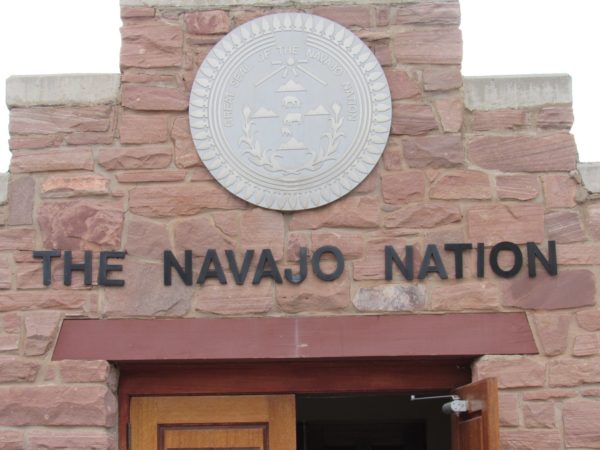
- Details
- By Native News Online Staff
WINDOW ROCK, Ariz. — On Tuesday, the Navajo Department of Health identified the following 75 communities with uncontrolled spread of Covid-19 from Jan. 1, 2021 to Jan. 14, 2021:
|
Aneth Baca/Prewitt Bird Springs Black Mesa Bodaway/Gap Bread Springs* Cameron Casamero Lake Chichiltah Chinle Churchrock Coppermine Cornfields Cove* Coyote Canyon Crownpoint Dennehotso Gadiiahi* Ganado Hard Rock* Hogback Houck Indian Wells Inscription House Iyanbito |
Jeddito Kaibeto Kayenta Lechee Leupp Lukachukai Lupton Many Farms Mariano Lake Mexican Springs* Nageezi Nahatadziil Nahodishgish Naschitti Nazlini Nenahnezad Oak Springs Oljato Pinedale Pinon Ramah Red Lake Red Mesa Red Valley Rock Point |
Rock Springs Rough Rock Round Rock San Juan Sanostee Sheepsprings Shiprock Shonto Smith Lake St. Michaels Standing Rock Tachee/Blue Gap Teec Nos Pos Teesto* Thoreau Tohatchi Tonalea Torreon Tsaile/Wheatfields Tsayatoh Tuba City Twin Lakes Two Grey Hills Upper Fruitland Whippoorwill |
* Chapters recently added to the list
“With more and more reports of the Covid-19 variant being reported in various regions, we must continue to take all precautions. The variant is reported to be much more contagious, making it easier for the virus to infect from person to person. I am hopeful that we are beginning to see a downward trend, but that depends on the actions of all of us. We all have a part to play in bringing down the numbers of new Covid-19 cases. Stay strong and keep fighting. We are in this together,” Navajo Nation President Jonathan Nez said.
Public Health Emergency Order No. 2021-001 remains in effect through Jan. 25, 2021 with the following provisions:
- Extends the Stay-At-Home Lockdown which requires all residents to remain at home 24-hours, seven days a week, with the exceptions of essential workers that must report to work, emergency situations, to obtain essential food, medication, and supplies, tend to livestock, outdoor exercising within the immediate vicinity of your home, wood gathering and hauling with a permit.
- Re-implements full 57-hour weekend lockdowns, including Friday, Jan. 22 beginning at 8:00 p.m. until Monday, Jan. 25 at 5:00 a.m. MST.
- Essential businesses including gas stations, grocery stores, laundromats, restaurants and food establishments that provide drive-thru and curbside services, and hay vendors can operate from 7:00 a.m. (MST) to 7:00 p.m., Monday through Friday only.
- Refrain from gathering with individuals from outside your immediate household and requiring all residents to wear a mask in public, avoid public gatherings, maintain social (physical) distancing, remain in your vehicle for curb-side and drive-through services.
On Tuesday, the Navajo Department of Health, in coordination with the Navajo Epidemiology Center and the Navajo Area Indian Health Service, reported 45 new Covid-19 positive cases for the Navajo Nation and no recent deaths. The total number of deaths remains 922 as previously reported on Monday. Reports indicate that 13,566 individuals have recovered from Covid-19, and 224,108 Covid-19 tests have been administered. The total number of positive Covid-19 cases is now 26,517.
More Stories Like This
Native News Weekly (August 25, 2024): D.C. BriefsNavajo Nation Mourns the Passing of Former Vice President Rex Lee Jim
Deb Haaland Earns Endorsement From Communications Workers of America Local 7076
University Soccer Standout Leads by Example
Two Native Americans Named to Democratic Congressional Campaign Committee's“Red to Blue” Program
Help us defend tribal sovereignty.
At Native News Online, our mission is rooted in telling the stories that strengthen sovereignty and uplift Indigenous voices — not just at year’s end, but every single day.
Because of your generosity last year, we were able to keep our reporters on the ground in tribal communities, at national gatherings and in the halls of Congress — covering the issues that matter most to Indian Country: sovereignty, culture, education, health and economic opportunity.
That support sustained us through a tough year in 2025. Now, as we look to the year ahead, we need your help right now to ensure warrior journalism remains strong — reporting that defends tribal sovereignty, amplifies Native truth, and holds power accountable.
 The stakes couldn't be higher. Your support keeps Native voices heard, Native stories told and Native sovereignty defended.
The stakes couldn't be higher. Your support keeps Native voices heard, Native stories told and Native sovereignty defended.
Stand with Warrior Journalism today.
Levi Rickert (Potawatomi), Editor & Publisher

